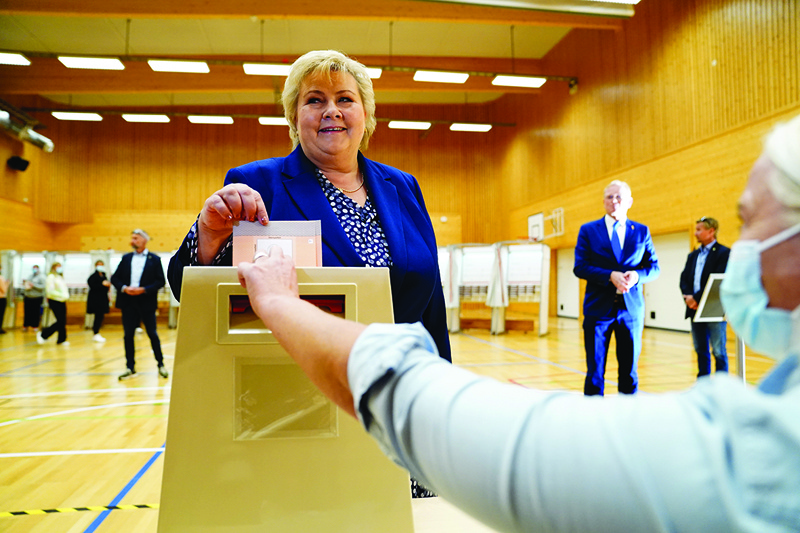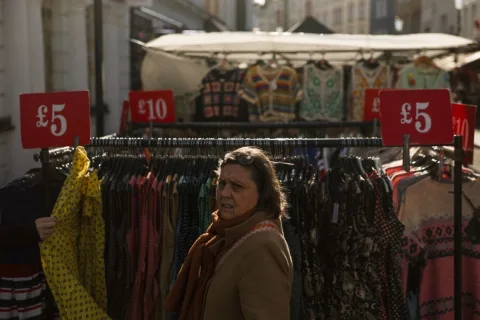 OSLO: Norwegian Prime Minister Erna Solberg, leader of the Conservative Party Hoyre, casts her vote for the 2021 parliamentary elections at Skjold School in her home town of Bergen yesterday.-AFP
OSLO: Norwegian Prime Minister Erna Solberg, leader of the Conservative Party Hoyre, casts her vote for the 2021 parliamentary elections at Skjold School in her home town of Bergen yesterday.-AFPOSLO: Norwegians voted yesterday in a parliamentary election broadly expected to see the "Red-Green" opposition win, potentially influencing the fate of oil activities in the largest producer in Western Europe. Polling stations opened at 9 am (0700 GMT) and first estimates based on advance ballots were to be released when voting ends at 9 pm.
According to opinion polls, a clear majority is emerging to unseat Prime Minister Erna Solberg's center-right government, which has ruled the Nordic country for the last eight years. The leader of Norway's Labour Party Jonas Gahr Store, a 61-year-old millionaire who has campaigned against social inequality, seems well placed to succeed her, but the exact shape of the coalition needed to pave his way to office is still unclear.
His party's preferred allies are the agrarian Centre Party and the Socialist Left Party, but if they are unable to reach a majority on their own they might depend on the support of the Green Party and or the communist Red Party, potentially complicating negotiations. According to an average of opinion polls conducted between August 2 and September 11 and published late Sunday by TV2, Store's preferred three-party coalition was due to get 85 of 169 seats in parliament, giving it the narrowest possible majority.
The center-right was seen garnering 67 mandates, while the Red Party was predicted to take nine and the Greens eight. "I have a good feeling," Store said as he cast his ballot at a school in Oslo on Sunday, with voting opening a day earlier in the major cities. More than 1.6 million Norwegians, or 42.3 percent of the electorate, had made use of early voting opportunities.
Overcoming addiction
The August "code red for humanity" report from the Intergovernmental Panel on Climate Change (IPCC) put the issue at the top of the agenda for the election campaign and forced the country to reflect on the oil that has made it immensely rich. The report energized those who want to get rid of oil, both on the left and, to a lesser extent, the right.
The Green Party is leading the charge in calling for an immediate halt to all oil exploration and a 2035 deadline for exploitation. That ultimatum has been rejected by Store, a former foreign minister. Like the Conservative Party, the other dominant political force in the country, Labour instead advocates a gradual withdrawal from oil.
The oil sector accounts for 14 percent of gross domestic product, as well as 40 percent of its exports and 160,000 direct jobs. In addition, the cash cow has helped the country of 5.4 million people amass the world's biggest sovereign wealth fund, today worth close to 12 trillion kroner (almost 1.2 trillion euros, $1.4 trillion).
"The demand for oil is on a downward path. This is happening by itself, by market forces. We don't need to decree it... but instead build bridges to future activities," Labour's energy chief Espen Barth Eide told AFP. "We will continue to have oil activities but we have to admit that the best oil years are behind us," he said.
Arctic exploration in question
According to many observers, a compromise will depend on the success of the parties with environmentalist leanings and could involve cutting off certain waters for oil exploration, particularly in the Arctic. For voter Fredrik Wessel, a 62-year-old lawyer at an insurance company, the main issue in the election was to "maintain good economic policy". "And then of course I'm concerned about the climate, that we consider everything we can to improve our climate," he told AFP as he left an Oslo polling station.
After eight years in power, and multiple crises including migration, falling oil prices and COVID-19, Solberg is likely to pass the baton. "If you think things are going well in Norway, vote Conservative," the 60-year-old said yesterday as she cast her ballot in her home town of Bergen. Asked what stood next on her agenda, the popular leader said she was heading home to "empty (her) suitcases" after seven weeks of election campaigning and "do laundry". -AFP










